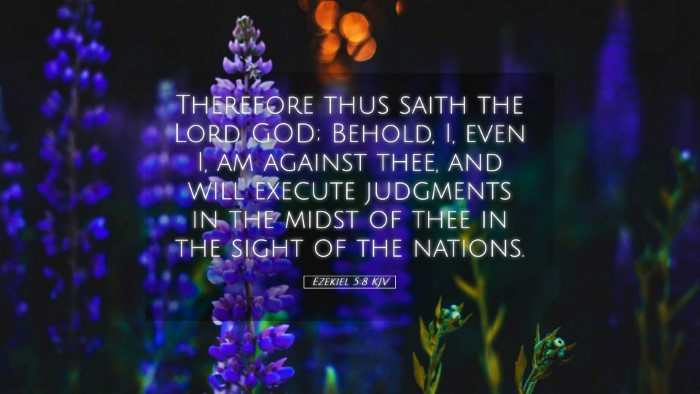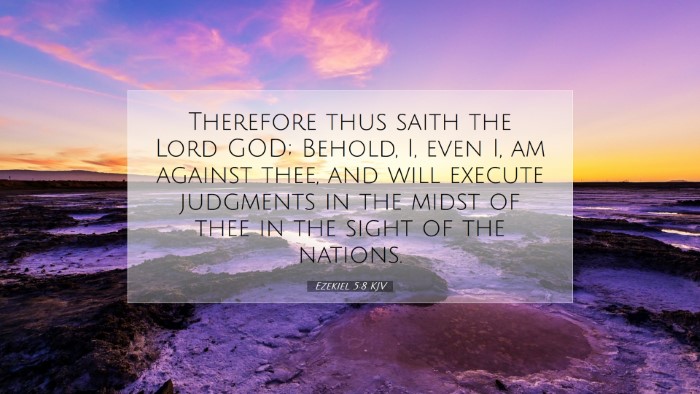Ezekiel 5:8 Commentary Summary
Ezekiel 5:8 states: "Therefore thus saith the Lord God; Behold, I, even I, am against thee, and will execute judgments in the midst of thee in the sight of the nations." This verse serves as a critical proclamation from God to Jerusalem, emphasizing His stance against the city and its inhabitants. The analysis of this verse is enriched by interpretations from prominent public domain commentaries, including those by Matthew Henry, Albert Barnes, and Adam Clarke.
Contextual Background
The prophet Ezekiel wrote during a turbulent period in Israel's history, marked by impending judgment due to pervasive idolatry and disobedience. The context of this verse situates it amidst divine warnings and the stark reality of God's wrath against the sinfulness of His chosen people.
Divine Judgment Declared
According to Matthew Henry, this verse underscores the gravity of God's judgment, presenting Him not as an aloof observer but rather as an active agent against transgressors. Henry comments that God's declaration of being "against" Jerusalem highlights the serious nature of their rebellion.
- Nature of God's Judgment: The judgment is described as direct and immediate, shedding light on the urgent need for repentance amongst the people.
- Visibility of Judgment: The reference to executing judgments "in the sight of the nations" indicates that God's actions serve not only as a punishment but also as a testimony to His supremacy observed by other nations.
The Sovereignty of God
Albert Barnes emphasizes the sovereignty of God as He declares, "I, even I, am against thee." This statement signifies that it is God's will that is being enacted, removing any doubt of divine authority in judgment.
- Personal Pronoun Use: The repetition of "I" denotes a personal engagement from God, affirming His relationship with Israel and His disappointment with their choices.
- Historical Context: Barnes notes that this marks a critical moment—God's patience is exhausted, and a decisive response is forthcoming, making it a lesson for future generations about divine retribution when warnings are ignored.
Theological Implications
Adam Clarke delves deeper into the implications of such divine abandonment where God Himself proclaims enmity against His people due to their transgressions. Clarke's commentary offers profound theological insights:
- God's Righteous Anger: Clarke articulates that God's judgments are not arbitrary but are rooted in His righteousness. His anger arises from a violation of covenant relationships.
- Call to Accountability: This verse serves as a reminder of accountability to divine standards; neglecting or deliberately subverting these standards invites judgment.
Lessons for Pastors and Theologians
For pastors and theologians, this text invites reflection on God's justice and mercy. It emphasizes the necessity of preaching repentance, recognizing that dismissing sin can lead to divine disfavor reminiscent of how God dealt with Jerusalem.
- Prevention of Judgment: The church is called to warn its members of the consequences of sin and to guide them back to the path of righteousness.
- Witness to the Nations: Just as God’s actions were visible to surrounding nations, today, believers' lives should reflect their faith, acting as a testimony to the broader world.
Concluding Thoughts
Ezekiel 5:8 serves as a sobering reminder of the holiness of God and His rightful response to sin. The collective insights from Henry, Barnes, and Clarke provide a multifaceted interpretation that challenges the reader to consider the implications of divine judgment in their own context and the continual need for genuine repentance.


